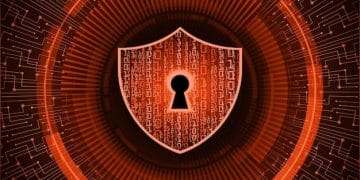Local Election Cybersecurity: Protecting US Voting Systems from Interference

Local Election Cybersecurity: Are Your Voting Systems Protected Against Interference? This article explores the vulnerabilities in local election systems and the measures being taken to safeguard them against cyberattacks and foreign interference, ensuring the integrity of US elections.
In an era where digital threats loom large, the security of local elections has become a paramount concern. The question on everyone’s mind is: Local Election Cybersecurity: Are Your Voting Systems Protected Against Interference? This article delves into the current state of cybersecurity measures protecting local elections in the US, examining vulnerabilities and exploring the strategies implemented to combat potential threats.
Understanding these measures is crucial for maintaining trust in the democratic process and ensuring every vote is accurately counted and protected from malicious actors.
Understanding the Landscape of Local Election Cybersecurity
Local election cybersecurity is a complex and multifaceted challenge, requiring constant vigilance and adaptation. Securing voting systems involves not only technological defenses but also procedural safeguards and human awareness. The ever-evolving threat landscape means that election officials must stay one step ahead of potential attackers.
This section explores the key components of local election cybersecurity, including common vulnerabilities and the current approaches used to mitigate them.
Common Vulnerabilities in Voting Systems
Voting systems, like any technology, are susceptible to vulnerabilities that can be exploited by malicious actors. Identifying and addressing these vulnerabilities is critical to ensuring the integrity of local elections.
- Outdated Software: Using outdated software can leave voting machines and election databases vulnerable to known exploits.
- Lack of Encryption: Insufficient encryption can expose sensitive voter data and election results to unauthorized access.
- Insufficient Access Controls: Weak access controls can allow unauthorized individuals to tamper with voting systems or election data.
- Physical Security Weaknesses: Physical access to voting machines and election infrastructure can also pose a significant risk if not properly secured.
Addressing these vulnerabilities requires a comprehensive approach, including regular security audits, software updates, and robust physical security measures.
Current Cybersecurity Measures in Place
To combat these vulnerabilities, election officials across the US have implemented a range of cybersecurity measures designed to protect local elections from interference. These measures include:
- Risk Assessments: Conducting regular risk assessments to identify potential vulnerabilities and prioritize security improvements.
- Vulnerability Scanning: Using automated tools to scan voting systems and election infrastructure for known vulnerabilities.
- Penetration Testing: Engaging security professionals to conduct simulated attacks to identify weaknesses in election systems.
- Incident Response Planning: Developing detailed incident response plans to quickly and effectively address any security breaches or cyberattacks.
These measures, when implemented effectively, can significantly reduce the risk of successful cyberattacks and ensure the accuracy and integrity of local elections.

In conclusion, understanding the landscape of local election cybersecurity involves recognizing both the vulnerabilities that exist and the measures being taken to address them. Ongoing vigilance and continuous improvement are essential to safeguarding the integrity of US elections.
The Role of Federal Agencies in Protecting Local Elections
While local election officials are on the front lines of cybersecurity, federal agencies play a crucial role in providing support, resources, and guidance. These agencies offer various services to help local jurisdictions enhance their cybersecurity posture and protect against interference.
This section examines the specific roles and responsibilities of key federal agencies involved in protecting local elections, shedding light on their contributions to securing the democratic process.
One of the most important aspects of protecting local elections is addressing the question: Are Your Voting Systems Protected Against Interference?
Cybersecurity and Infrastructure Security Agency (CISA)
CISA, a component of the Department of Homeland Security, is the lead federal agency for coordinating cybersecurity efforts across the US. CISA provides a range of services to support local election officials, including:
- Cybersecurity Assessments: Conducting assessments of election systems to identify vulnerabilities and provide recommendations for improvement.
- Information Sharing: Sharing threat intelligence and best practices with local election officials to keep them informed of emerging threats.
- Incident Response Support: Providing on-site support to local jurisdictions in the event of a cyberattack or security breach.
CISA’s proactive approach and collaborative efforts are essential to strengthening the cybersecurity of local elections nationwide.
Federal Bureau of Investigation (FBI)
The FBI is responsible for investigating cybercrimes and foreign interference in US elections. The FBI works closely with state and local law enforcement agencies to investigate potential threats and prosecute those responsible.
- Threat Intelligence: Providing threat intelligence to local election officials to help them understand the risks they face.
- Cybersecurity Training: Offering cybersecurity training to election officials and staff to improve their awareness of potential threats.
- Investigative Support: Providing investigative support to local jurisdictions in the event of a cyberattack or security breach.
The FBI’s investigative capabilities and expertise are crucial to deterring and disrupting malicious actors seeking to interfere with local elections.

In conclusion, federal agencies like CISA and the FBI play a vital role in supporting local election cybersecurity efforts. Their expertise, resources, and collaborative approach are essential to protecting US elections from cyber interference.
The Importance of Voter Education and Awareness
While technological defenses are critical, voter education and awareness are equally important in protecting local elections. Informed voters are less likely to fall victim to disinformation campaigns and more likely to trust the integrity of the electoral process.
This section explores the importance of voter education and awareness programs, highlighting the key messages that should be communicated to the public.
Combating Disinformation
One of the biggest threats to local elections is the spread of disinformation, which can undermine voter confidence and discourage participation. Voter education programs should focus on:
- Identifying False Information: Teaching voters how to recognize false or misleading information online.
- Verifying Information: Encouraging voters to verify information from trusted sources before sharing it.
- Reporting Disinformation: Providing voters with resources to report disinformation to election officials or social media platforms.
By empowering voters to identify and combat disinformation, we can protect the integrity of local elections and maintain public trust.
Promoting Secure Voting Practices
Voter education programs should also promote secure voting practices, such as:
- Protecting Voter Registration Information: Emphasizing the importance of protecting personal information and being cautious about sharing it online.
- Using Secure Wi-Fi Networks: Advising voters to use secure Wi-Fi networks when accessing online voter registration portals and election information.
- Reporting Suspicious Activity: Encouraging voters to report any suspicious activity or potential security breaches to election officials.
By promoting these practices, we can help voters protect themselves from cyber threats and ensure the security of their votes.
In conclusion, voter education and awareness are essential components of local election cybersecurity. By empowering voters with the knowledge and skills they need to identify and combat disinformation, we can strengthen the integrity of US elections and maintain public trust in the democratic process.
Future Trends in Local Election Cybersecurity: Are We Prepared?
The threat landscape is constantly evolving, and local election cybersecurity must adapt to meet emerging challenges. This section examines future trends in cybersecurity and explores how election officials can prepare for the threats of tomorrow.
Remaining vigilant and proactive about defending against foreign interference in the election process is critical with technological advancements and artificial intelligence becoming more accessible.
Artificial Intelligence (AI) and Machine Learning
AI and machine learning are being used to develop more sophisticated cyberattacks, including:
- Deepfakes: Creating realistic but fake videos and audio recordings to spread disinformation and manipulate voters.
- Automated Disinformation Campaigns: Using AI to generate and disseminate disinformation on a large scale.
- AI-Powered Cyberattacks: Developing AI-powered malware that can evade traditional security defenses.
To counter these threats, election officials must invest in AI-powered cybersecurity tools and train their staff to recognize and respond to AI-driven attacks.
Blockchain Technology
Blockchain technology offers the potential to enhance the security and transparency of local elections. Potential applications of blockchain in elections include:
- Secure Voter Registration: Using blockchain to create a tamper-proof voter registration database.
- Transparent Vote Counting: Using blockchain to create a transparent and auditable vote counting system.
- Secure Online Voting: Using blockchain to enable secure online voting for absentee voters and those with disabilities.
While blockchain technology is not a silver bullet, it offers a promising approach to improving the security and integrity of local elections.
In conclusion, future trends in cybersecurity pose significant challenges to local elections. By investing in new technologies, training staff, and collaborating with federal agencies, election officials can prepare for the threats of tomorrow and ensure the integrity of US elections.
Case Studies: Successful and Unsuccessful Cybersecurity Measures
Examining real-world examples is invaluable for understanding what works and what doesn’t in local election cybersecurity. This section presents case studies of both successful and unsuccessful cybersecurity measures, providing valuable insights for election officials seeking to improve their security posture.
Successful Incident Response: Preventing a Major Breach
In 2020, a local election office in a swing state detected suspicious activity on its network. The office immediately implemented its incident response plan, which included:
- Isolating the Affected Systems: Disconnecting the affected systems from the network to prevent further spread of the attack.
- Engaging Cybersecurity Experts: Contacting cybersecurity experts for assistance in investigating and remediating the incident.
- Coordinating with Federal Agencies: Informing CISA and the FBI of the incident and coordinating response efforts.
These coordinated efforts helped to quickly contain the incident, preventing a major breach and preserving the integrity of the election. This case study illustrates the importance of having a well-defined incident response plan and the value of collaboration with federal agencies.
Unsuccessful Implementation: A Missed Vulnerability
In another case, a local election office failed to address a known vulnerability in its voting machines. This vulnerability was later exploited by malicious actors, who were able to gain unauthorized access to the voting systems.
- Ignoring Security Audits: Failing to conduct regular security audits to identify potential vulnerabilities.
- Delaying Software Updates: Delaying or neglecting to install critical software updates that patched known vulnerabilities.
- Lack of Training: Failing to provide adequate cybersecurity training to election officials and staff.
This incident highlights the importance of addressing known vulnerabilities in a timely manner and investing in ongoing security audits and training.
In conclusion, case studies provide valuable lessons for local election cybersecurity. By learning from both successes and failures, election officials can improve their security posture and better protect US elections from cyber interference.
The Legal and Regulatory Framework Surrounding Election Security
A strong legal and regulatory framework is essential for supporting local election cybersecurity efforts. This section examines the existing laws and regulations governing election security, as well as potential reforms that could further strengthen cybersecurity protections.
Federal Laws and Regulations
Several federal laws and regulations address election security, including:
- The Help America Vote Act (HAVA): HAVA established minimum standards for voting systems and provided funding for states to improve their election infrastructure.
- The National Voter Registration Act (NVRA): NVRA requires states to maintain accurate and up-to-date voter registration lists.
- The Computer Fraud and Abuse Act (CFAA): CFAA prohibits unauthorized access to protected computer systems, including election systems.
These laws provide a foundation for election security, but many experts believe that additional regulations are needed to address emerging cyber threats.
Potential Reforms
Several potential reforms could strengthen the legal and regulatory framework surrounding election security, including:
- Establishing Mandatory Cybersecurity Standards: Requiring states to meet minimum cybersecurity standards for voting systems and election infrastructure.
- Increasing Funding for Election Security: Providing additional funding to states to improve their cybersecurity capabilities.
- Enhancing Information Sharing: Improving information sharing between federal agencies and local election officials.
These reforms would help to ensure that local elections are protected from cyber interference and that voters can have confidence in the integrity of the electoral process.
In conclusion, a strong legal and regulatory framework is essential for supporting local election cybersecurity efforts. By strengthening existing laws and implementing new regulations, we can better protect US elections from cyber interference and ensure the integrity of the democratic process.
| Key Point | Brief Description |
|---|---|
| 🛡️ Vulnerabilities | Outdated software and weak access controls are major risks. |
| 🏛️ Federal Role | CISA and FBI provide support and investigate cybercrimes. |
| 📚 Voter Education | Combating disinformation is key to secure elections. |
| 🔮 Future Trends | AI and Blockchain will shape election cybersecurity. |
Frequently Asked Questions
The biggest threats include malware attacks targeting voting machines, ransomware attacks disrupting election infrastructure, and disinformation campaigns aimed at undermining voter confidence in the integrity of local election cybersecurity: are your voting systems protected against interference?
Local election officials can improve their cybersecurity posture by conducting regular risk assessments, implementing robust security controls, training staff on cybersecurity best practices, and coordinating with federal agencies like CISA and the FBI.
Federal agencies such as CISA and the FBI provide support, resources, and guidance to local election officials to help them enhance their cybersecurity posture and protect against interference. They also investigate cybercrimes and foreign interference in US elections in the context of local election cybersecurity: are your voting systems protected against interference?
Voters can protect themselves by verifying information from trusted sources, being cautious about sharing personal information online, using secure Wi-Fi networks when accessing election information, and reporting any suspicious activity to election officials.
Emerging technologies such as blockchain and AI offer the potential to enhance the security and transparency of elections by securing voter registration databases and vote counting systems, helping to address local election cybersecurity: are your voting systems protected against interference? issues.
Conclusion
Securing local elections is an ongoing challenge that requires a multifaceted approach. By addressing vulnerabilities, collaborating with federal agencies, educating voters, and embracing new technologies, we can protect the integrity of US elections and maintain public trust in the democratic process.
As technology evolves, so too must our strategies for ensuring Local Election Cybersecurity: Are Your Voting Systems Protected Against Interference? Staying vigilant and informed is crucial for safeguarding democracy in the digital age.





